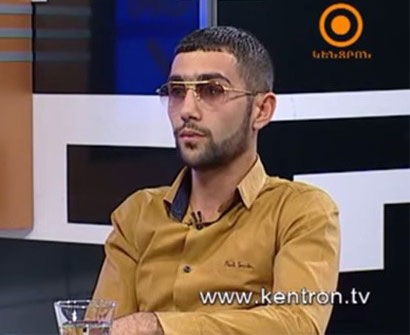People are longing for a positive word
We have all sit in a taxi and have listened to the taxi drivers’ conversations. Usually, they are social type complaints (“How can these poor people live?”, “No one is left in this country”), which are interrupted only when another taxi driver crosses the way of this taxi driver. In this case, the political topics are interrupted by the four-storey phrases, because this taxi driver is sure the life sense of his partner was to do him harm, cut off the road and squeeze into the line. There are two ways to return to the politics after this “deviation”. Option “A”, “No humane is left is these people, while, in the past, there was a distinction between the elderly and the young, there was also respect.” Option “B”, “Anyone can get a driving license, while, in the past, there was rule and order, and the drivers were taking an exam.”
Taxi driver Arman Galstyan who became widely known in our society, thanks to the mass media (especially, in Petros Ghazaryan’s “Urvagits” program), is a young man by age and has less reason to say, “while, in the past”. (Although many young people are now repeating their parents’ nostalgic judgments). “While, in the past” is a very dangerous thing for both the individual and the society. People begin “grieving” that they are no longer “the past”, and the past becomes not an exciting memory (it would be very nice), but a masochistic reference based on the fantastic assumptions. “I wish those times were now, how good it would be.” Or worse, “I wish I had done like that, my situation would be much better.” The Americans call it “crying over spilt milk.”
Arman’s language, although is poor because of education limitations and reflects the realities of his environment, yet it is rational, is located in the reality, does not underlie “in the panic mode”, “the kleptocracy is giving cracks” and other propaganda clichés, which, in theory, should “encourage” the supporters, but being detached from reality, they are ultimately disappointing. He also talks about the problems, which he understands, and his word is positive and is aimed at solving these problems.
Eventually, he is not a member of any political party or an NGO, for the above-mentioned and many other reasons, they have lost the trust of the people, and yet it will require a lot of time to restore this trust. Armani’s success proves that people want to hear fresh ideas and to see new faces.
Indeed, any success generates an army of enviers. The politicians are probably thinking, “We, the educated, we, the learned, are seen in different broadcast and many news clubs every day, but our epoch-making thoughts, at the best, bring several hundred views, while this taxi driver is viewed 300,000 times.” Perhaps, a part will also assume that all of this is organized by the “regime” to divert people’s attention. Well, the “taxi NGOs” for the same reasons, are simply organizing scenes of jealousy by accusing Arman of having the intention to be an “oligarch man” and “organizing a taxi parking lot”.
Indeed, Arman Galstyan’s success, like everything in this world, is temporary. He will either go to a party or an NGO or his “fashion” will gradually fade away. But followed by his example, it is perhaps worth thinking about what kind of speech the society is longing.
Aram ABRAHAMYAN


















































